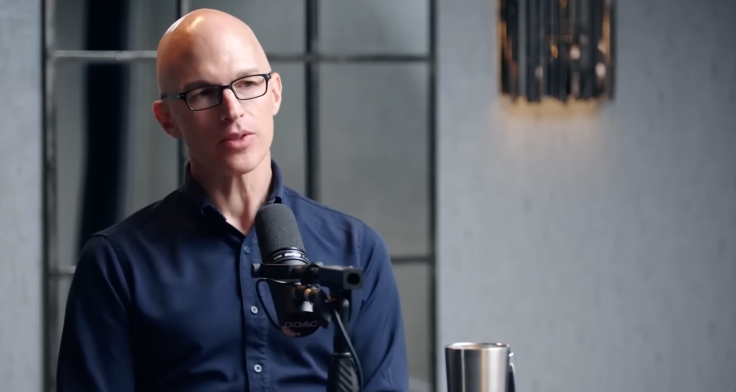This Simple 5-Step Plan Promises Wealth—But Experts Say You'll Still Need Grit
Kaufman's work focuses on business, psychology, entrepreneurship and learning strategies.

Building a thriving business is something many dream of, but how exactly do successful entrepreneurs make it happen? According to best-selling author and entrepreneur Josh Kaufman, it all begins with asking the right questions. In a recent episode of The Diary Of A CEO, a podcast hosted by investor Steven Bartlett, Kaufman shared the simple yet powerful framework he believes can unlock wealth and entrepreneurial success. But is it really that easy? A UK finance expert suggests there may be more to the story.
Kaufman's 5-Question Business Philosophy
Kaufman argues that the success of 'every business from the smallest startup to the largest corporation in the world' hinges on whether its leaders understand and address the following five questions:
- How is this business creating value?
- How does it attract the attention of people who might want or need what this business provides?
- How does it convince people to pull out their wallet or credit card and give the business money?
- How does the business deliver the value that it is promising to its paying customers?
- Is it making enough to make all of the time and energy and effort that's being put into the business by the owner and the employees worthwhile?
Kaufman calls these questions 'the essence of finance', emphasising the need to understand business in a systematic, logical way.
'Each of these parts is universal, essential and fundamental,' he said. 'This is the foundation of every business plan that has or ever will exist.'
He also highlighted that these principles are not limited to business owners. Job seekers who understand this mindset may increase their chances of being hired.
'By having this framework in your head, by understanding these things and being able to ask these questions, by being able to know what's important and what's not and think like an owner or an operator is what owners and operators, executives and managers are looking for in terms of people to hire,' Kaufman explained.
Ultimately, Kaufman's belief is that wealth is available to anyone who can answer these questions in a meaningful way. 'How are you going to create value that someone else in the world wants or needs?' he asked.
While these questions certainly provide a strong starting point, IBT UK consulted a personal finance expert to explore whether they're enough on their own to ensure long-term business success.
Finance Expert: It's Not That Simple
Alex King, a chartered accountant and entrepreneur, believes Kaufman's five questions are a 'solid foundation'—but ultimately too simplistic.
'An entrepreneur may be able to answer those points in the abstract,' he said, 'but the reality of executing on a business idea is more complex.'
King highlights the importance of adaptability and realistic financial planning. Businesses often change dramatically between the idea stage and their eventual launch. Being able to pivot is essential, according to King.
'Being able to adapt (rather than give up) often marks a successful entrepreneur from an unsuccessful one. Sometimes, entrepreneurs can be too rigid at sticking with their plan and not realise they need to compromise or adjust when market realities mean they need to,' he said.
Another critical factor is planning for financial reality.
'Many business owners overestimate revenue and underestimate costs, which can lead to poor cash flow planning,' King explained. 'Being able to be realistic and disciplined with your financial plan, no matter how optimistic or enthusiastic you are about your business, is crucial.'
Why Mindset Matters Most
While business plans and financial models are vital, King insists that the mental attitude of an entrepreneur is just as important.
'A lot of an entrepreneur's day involves mundane, unglamorous and repetitive tasks,' he said. 'This is especially true in the early stages, where you're often making no money and having to do work that seems a million miles away from success.'
Resilience, therefore, becomes critical.
'Can you handle working long hours every day on often boring tasks for months on end with no real income coming in?' King asked. 'That's the reality a lot of businesses face in the early stages.'
He added: 'You may have a great business idea with a product or service that customers would love. But you need to be able to shut out the noise and ruthlessly focus on the core tasks needed to execute your business and financial plan.'
To anyone looking to start a business, King's advice is clear: 'Put as much work as possible into developing a realistic business and financial plan. You can have the best product in the world, but nobody will find out about it if you burn through cash too soon and have to shut down.'
Who Is Alex King?
Alex King is a graduate of the London School of Economics and a Chartered Accountant. He worked at Barclays Investment Bank from 2013 to 2022, eventually becoming a Vice President. In 2023, he launched Generation Money, a financial education platform designed to teach young people how to manage their money, invest wisely, and understand the stock market.
Generation Money also publishes reviews of popular investing apps and offers in-depth guides on topics such as saving, budgeting, and building wealth.
A Balanced Approach to Business Success
Kaufman's five essential questions provide a smart and accessible framework for thinking about business. But as King rightly points out, starting and sustaining a business takes more than just the right questions. It demands adaptability, careful planning, mental resilience and financial discipline.
The takeaway? Success in business comes from combining vision with practicality. Asking the right questions can lay the foundation—but it's sticking with your plan, adapting to reality, and grinding through the tough parts that will ultimately determine whether your business thrives.
© Copyright IBTimes 2025. All rights reserved.






















